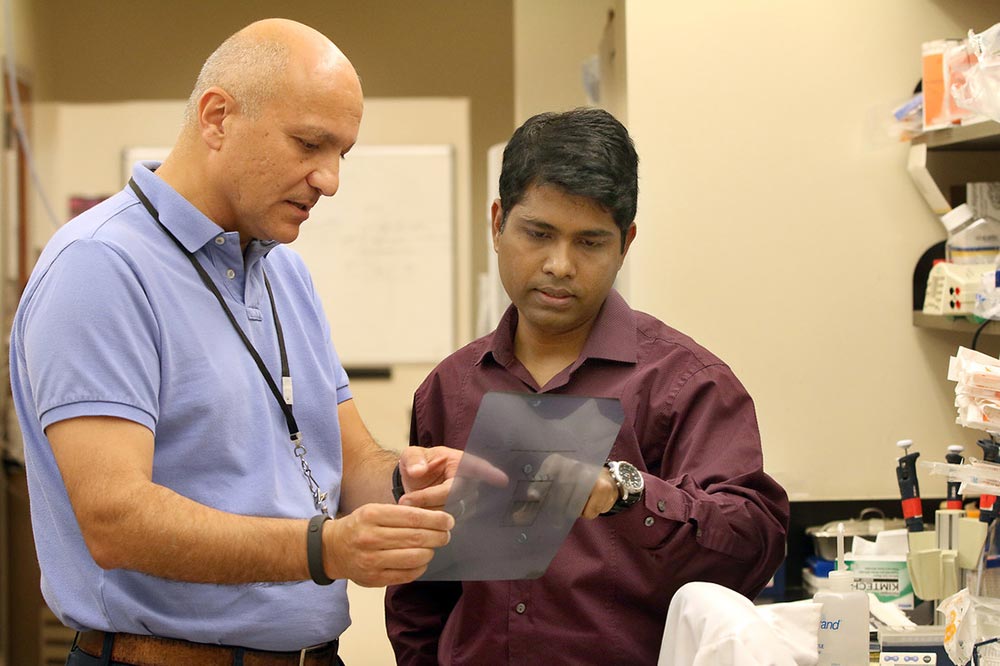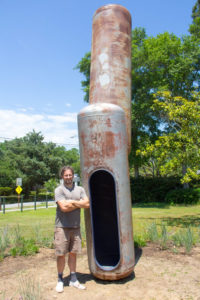
Dr. Besim Ogretmen, Hollings Cancer Center researcher, left, and Dr. Shanmugam Selvam discuss their work at the Hollings Cancer Center, home to more than 70 research labs and 400 researchers. MUSC photo by Sarah Pack
Staff reports | The Hollings Cancer Center of the Medical University of South Carolina (MUSC) recently won renewal of its designation as a National Cancer Institute (NCI) Cancer Center.
“MUSC is proud to have the only NCI-designated cancer center in South Carolina,” MUSC President David J. Cole said in a press release. “This renewal validates the significant, ongoing and dedicated effort by Hollings Cancer Center scientists toward advances in cancer prevention, diagnoses and treatment, with the ultimate goal of finding cancer cures.”
NCI-Designated Cancer Centers represent the top 4 percent of cancer centers in the United States. With this five-year renewal, Hollings is one of only 70 cancer centers in the U.S. with this prestigious status and the only such institution in South Carolina. The renewal is accompanied by $10,781,505 in funding to sustain and grow research efforts at Hollings Cancer Center.
Recent accomplishments include:
- 392 cancer-related research studies involving 3,522 people between 2014 and 2017
- A mobile health van used for cancer screening and education in 27 counties. It has served more than 7,000 women in five years.
- 42 clinical trials between 2013 and 2017.
- More than $40 million in peer-reviewed, extramural research project awards. Learn more.
In recent Good News:
![]() Big gift. An anonymous donor gave $150,000 to the College of Charleston’s Race and Social Justice Initiative. The donation will “fundamentally transform the initiative’s impact in Charleston and beyond,” the college said in a press release. The new support will help the program to facilitate “public events, exhibitions and various projects to promote awareness of the history and ongoing struggles of racial injustice in Charleston, the state of South Carolina and across the United States.”
Big gift. An anonymous donor gave $150,000 to the College of Charleston’s Race and Social Justice Initiative. The donation will “fundamentally transform the initiative’s impact in Charleston and beyond,” the college said in a press release. The new support will help the program to facilitate “public events, exhibitions and various projects to promote awareness of the history and ongoing struggles of racial injustice in Charleston, the state of South Carolina and across the United States.”
Busy at the port. The S.C. Ports Authority (SCPA_ this month reported 10.4 percent fiscal year-to-date container volume growth, with nearly 2 million twenty-foot equivalent container units (TEUs) handled since July. The ports authority moved 204,621 TEUs across the Wando Welch and North Charleston container terminals last month, a 4.2 percent increase compared to April 2018 volumes. “Our continued growth is testament to the commitment and skills of our employees and maritime community, and we look forward to a very positive FY2019 finish in June,” said Jim Newsome, SCPA president and CEO.
Legal eagles. Hat off to the 157 May graduates of the Charleston School of Law, the largest class that the school has had in six years.
 Temporary sculpture. The Charleston Parks Conservancy is bringing public sculpture to the West Ashley Greenway with a temporary art installation by Georgia artist Mike Wsol. The piece was installed May 8 near the St. Andrew’s School of Math and Science between Campbell Drive and the West Ashley Greenway. Titled “Under Glass,” Wsol said the sculpture was “designed with the natural sciences and spirituality in mind. Its form divided in two chambers separates the viewer below from the natural light entering and reflecting within the upper chamber.
Temporary sculpture. The Charleston Parks Conservancy is bringing public sculpture to the West Ashley Greenway with a temporary art installation by Georgia artist Mike Wsol. The piece was installed May 8 near the St. Andrew’s School of Math and Science between Campbell Drive and the West Ashley Greenway. Titled “Under Glass,” Wsol said the sculpture was “designed with the natural sciences and spirituality in mind. Its form divided in two chambers separates the viewer below from the natural light entering and reflecting within the upper chamber.
New name. The Charleston County Park and Recreation Commission (CCPRC)’s non-profit arm, The Parklands Foundation, recently took on a new name. Now known as the Charleston County Parks Foundation, the organization will also be using a new website, CharlestonCountyParksFoundation.org. The goal of the name change is to identify the foundation as being run by CCPRC. Donations will subsidize access to the parks, programs and services that CPRC provides to the community. The executive director of The Charleston County Parks Foundation is CCPRC Executive Director David Bennett.
Year of the Environment. Sister publication correspondent Lindsay Street outlines how the 2019 legislative session became the “year of the environment” with wins on solar energy and growing resistance to offshore oil drilling and the idea of banning local bans on plastic bags. Learn more about this interesting legislative year in the recent issue of Statehouse Report.



 We Can Do Better, South Carolina!
We Can Do Better, South Carolina!
























